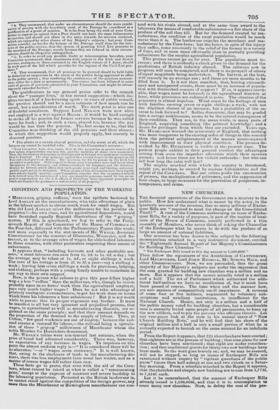CONDITION AND PROSPECTS OF THE WORKING POPULATION.
4‘ MERCILESS, griping ruffians," were the epithets bestowed by Lord ASHLEY on the manufacturers, who take advantage of gluts in the labour-market to obtain much work for small wages. But why did Lord ASHLEY select the millowners for his peculiar ob- jurgation?—his own class, and its agricultural dependents, would bave furnished equally flagrant illustrations of the " griping" system. If this is questioned, we beg to refer to the Forty- seventh Report of the Committee of the House of Commues on the Poor-law, delivered with the Parliamentary Papers this week ;
and more especially to the statements of Mr. WEALE, Assistant Commissioner for the counties of Gloucester, Worcester, and So- merset, as to the average rates of wages for able-bodied labourers in these counties, with other particulars respecting their means of subsistence.
It appears that, "including harvests and other profitable sea- sons," a stout labourer can earn from Is. 2d. to Is. 8d. a day ; hut the average may be taken at Is. 4d., or eight shillings a week. The rent of his cottage is from 2/. to 31.a year—say a shilling a week ; leaving him seven shillings a week for provisions, lodging, and clothing, perhaps with a young family unable to contribute in any way to their own support.
Now, is the person who refuses to give this poor fellow higher wages a less " ruffian " than the millow nor, who, though he insists probably upon more hours' work than the agricultural employer, pays. very much higher wages ? Does lie not take advantage of precisely analogous circumstances, to get his work done on terms which leave his labourers a bare subsistence ? But it is not worth while to pursue this tu gunque argument any further. It must be tnanifest to all but very ignorant and prejudiced persons, that wages, in agricultural as well as manufacturing districts, are re- gulated on the same principle; and that their amount depends on the proportion of the demand to the supply of labour. Thus, at Clifton, "few good workmen are out of employ," because the rail- road creates a demand for labour,—the railroad being a specula- tion of those " griping" millowners of Manchester whom the noble Member for Dursetsbire denounced.
Mr. WEALE'S tables were constructed last autumn, when the price of bread had advanced considerably. There was, however, no expectation of any increase in wages. To inquiries on this point the almost uniform reply is—" It is considered there will be noalteration "—or " wages seem stationary." It is well known, that, owing to the slackness of' trade in the manufacturing dis- tricts, there was less employment than usual last winter, and as a Matter or course wages fell rather than rose.
These facts go to prove. that even with the aid of the Corn- laws, wheat cannot be raised at what is called a " remunerating price,' except at the expense of constant and severe hardship to the labouring population. Protected as the British landowner is, be cannot stand against the competition of the foreign grower, any more than the Manchester or Birmingham manufacturer can con- tend with his rivals abroad, and at the same time award to the labourers the means of comfortable subsistence—a fair share of the produce of the soil they till. But for the demand created by ma- nufactures, the condition of the rural population would be much worse than it is. The landowner cripples the merchant and ma- nufacturer by the Corn-laws; but the latter, in spite of the injury they suffer, come constantly to the relief of the former in a variety of ways, and in none more effectually than in partially providing subsistence for the surplus agricultural population. This process cannot go on for ever. The population must in- crease; and there is evidently a check given to the demand for the
productions of British industry abroad. The railways now in progress will soon be completed, and there is no prospect of others of equal magnitude being undertaken. The harvest, at the best, will scarcely be an average one; and there are more mouths to be filled from it. Is it not then manifest, that, barring extraordi- nary and unexpected events, there must be an increase of popula- tion with diminished sources of support ? It' so, it appears inevit- able, that wages must be lowered, in the agricultural districts at least, while provisions are enhanced in price. The situation of the peasantry is almost hopeless. What must be the feelings of men with families earning seven or eight shillings a week, with not the slightest chance of an increase, but a probability of the re- verse to look forward to? Sullen discontent, that may be goaded into a savage recklessness, seems to be the natural consequence of their condition. They are, in the mean while, in many parts of Englund, acquiring something like political knowledge ; and a desire for privileges from which they are excluded. Years ago, Mr. Husitissoar warned the aristocracy oh England, that nothing was more dangerous to the existing order of things in this country than the political enlightenment of the masses unaccompanied with improvement in their physical condition. The process de- scribed by Mr. HUSKISSON is visible at the present time. The patient people exhibit in their general conduct the advantages arising from even the imperfect education which their masters permit ; tied hence there are few violent outbreaks : but who can tell how long the calm will last?
The mighty mischief with which the country is threatened, might yet, perhaps, be averted by copious Colonization aid the repeal of the Corn-laws. But our rulers prefer the construction of prisons, the multiplication of policemen, and the suppression of beer-shops, to large measures fur the prevention of pauperism, in- temperance, and crime.


























 Previous page
Previous page